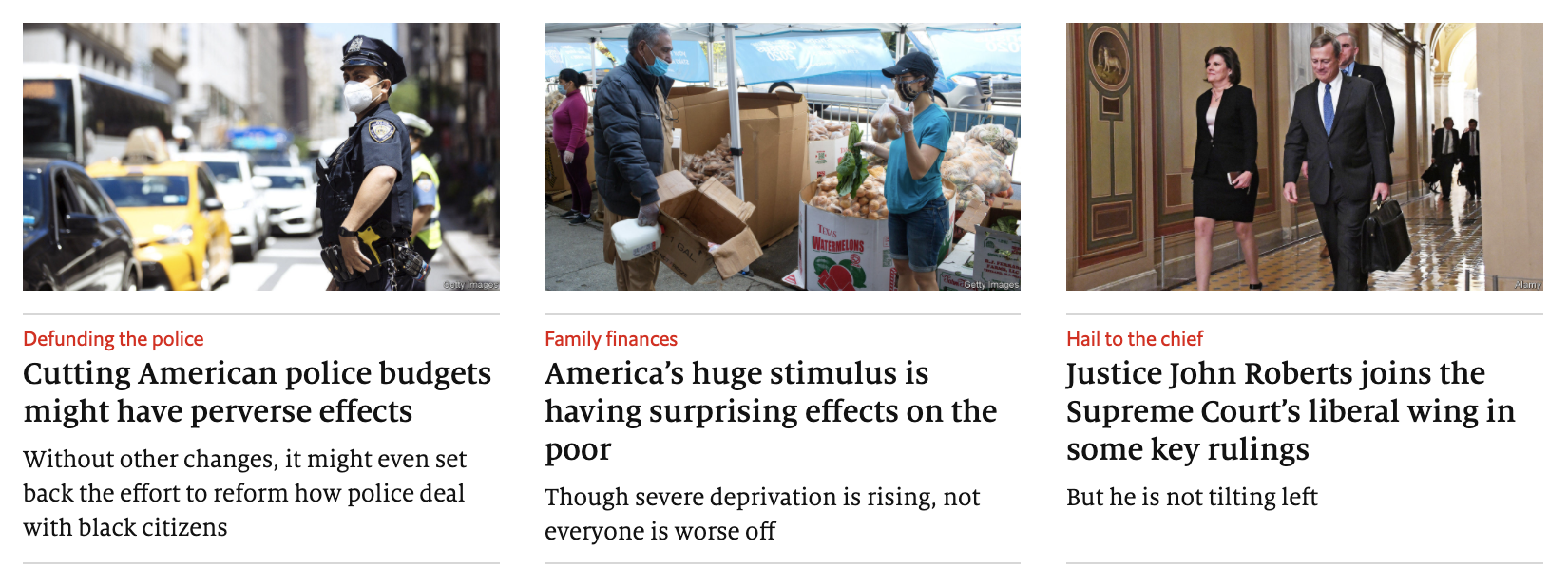Smuggled frames
I think that people get a very large amount of what they believe through importance claims and existence claims that others are inflicting upon them. Kinda like "accepting the premise", except that all claims make at least one implicit premise.
I don't know where to go from here, but I want to make this process very explicit.
For example, whenever somebody start talking about the best way to solve a problem X, you might disagree with their solutions but you will update slightly towards "problem X exists" and perhaps "problem X is important". These might be very contentious claims, but they get smuggled without an argument.
Here is The Economist telling you some facts about things that happened in the summer of 2020:

In order for these headlines to make sense, you must accept a number of assumptions. What are those assumptions?
"Justice John Roberts joins the Supreme Court's liberal wing in some key rulings"
Let's start with the Supreme Court headline.
- EXISTENCE/IMPORTANCE CLAIM: "The Supreme Court has a liberal wing"
- EXISTENCE/IMPORTANCE CLAIM: "Some rulings are particularly important"
- EXISTENCE CLAIM: "And it's possible to know which (and we know which)"
Under the guise of a simple fact, three other claims have been smuggled into your brain. The first claim is the easiest to debate, so I'll go with it.
"The Supreme Court has a liberal wing".
You are invited to believe that there is a framework for analyzing how the Supreme Court operates (divide the justices into wings), and that it is a useful analysis tool.
What if it's not a useful analysis tool?
- What if the justices don't particularly follow the ideology lines?
- What if you should care about how experienced or smart or [whatever] the appointed justices are, rather than sigh and go "oh well, Trump got another judge of his own in the Court"? What if some Supreme Court decisions are bad because some justices are shit at interpreting the Constitution, and should not have been appointed in the first place? Has the quality of the Court's legal output declined over the past years?
- What if the real fight is between, say, originalists and adherents of the living Constitution approach, and you should be much more concerned about that?
- Etc, etc, etc.
This single implicit claim about the existence of "the liberal wing" is shaping the kinds of discussions you are inclined to have about the Supreme Court. Brick by brick, your worldview is being built out of others' worldviews.
"Cutting American police budgets might have perverse effects"
I think the implicit claim in this headline is that by talking about the police budgets, people might change something. It's an existence claim, in a way, though it tells you what's possible and not what exists.
Why would The Economist talk about cutting police budgets if there was no point in talking about them? And indeed, if The Economist believed it was impossible to change anything, the headline would look different, e.g. "What will happen after American police budgets are cut".
Let's go further: imagine if The Economist ran a headline in 2016 that went "Accepting Trump's election as legitimate might have perverse effects". That wouldn't be wrong. But they would never phrase it like that—because it'd mean suggesting that there was a serious choice whether to accept the election as legitimate. Not a "hear my radical idea" suggestion in the opinion column, but an actual sober choice.
And there was a choice! You could just say: no, Trump is not a legitimate president. It was a thing you could do, and 23% of Clinton voters did, on the day after the election. If The Economist was, year after year, suggesting to its readers that they had a choice whether to accept the election as legitimate—and, importantly, also implying (by virtue of being discussed in The Economist!) that this choice mattered — that percentage would probably be higher.
This is how The Economist tells you what is possible and what isn't; what is worth taking seriously and what isn't. You might completely disagree with its opinions, but as long as you assume that The Economist is not being irrelevant, some of its worldview is still rubbing off.
Legitimacy claims
I haven't talked about legitimacy much, but you can figure it out. "Who has legitimate authority over what" is also conveyed implicitly and not explicitly, and sometimes saying "no, I don't accept that X's authority is legitimate" can be very interesting.
This old headline is a good example of how authority over e.g. science was different in the old times: "Board to pass final judgment on all ether questions".

Where to go from here
I don't know.
I think I'll just spend a while noticing claims like that being smuggled into my brain, and see what happens.
P.S. A non-political example
Here is a non-political example: we believe, for instance, a) that it's important for correct spelling to exist, and, simultaneously, b) that objective rules of spelling don't exist. These are our two paradigms. And so somebody has to set the rules for spelling, and we care about those rules and argue about them.
If we thought that objective rules for spelling existed and could be discovered, our newspapers wouldn't print articles like "Merriam-Webster just recognised ‘irregardless’ as a real word". We'd turn to linguists instead, and ask them: please research which words are easier to understand, or perhaps easier to pronounce, or just somehow fit the shape of our brains better. Then we'd use their findings. But this doesn't happen much.
On the other hand, if we thought that correct spelling wasn't important, we just wouldn't bother. Dictionaries would still exist, but they'd have no authority, because nobody would look at them. So the question of "does such-and-such authority's power legitimate?" wouldn't make sense—the authority doesn't have any power. It's only when the power can exist it makes sense to argue about who should have it, and the claim that the power can/should exist is not always obviously true.